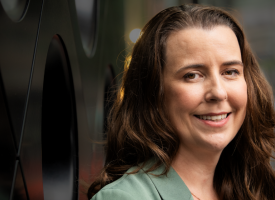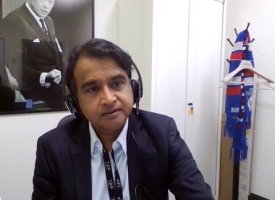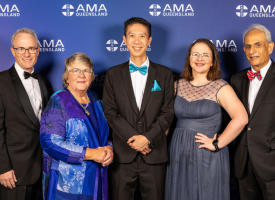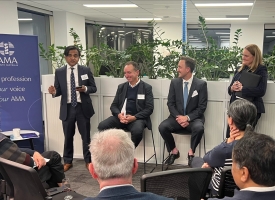Tailored solutions needed to tackle health workforce crisis
Queensland's healthcare workforce must be supported financially, culturally and psychologically if we want to recuit, train and retain doctors for the long-term, AMA Queensland President Dr Nick Yim said. "Across the state of and within Queensland Health there needs to be a structure change from a cultural perspective... We know that if our workforce is supported culturally and from a psychological perspective, this will help minimise burnout and it just means that they'll stay in our workforce longer."

Transcript: AMA Queensland President Dr Nick Yim, 4BC Radio, Mornings with Bill McDonald, Wednesday 21 May 2025
Subjects: Workforce, nitazenes, First Nations health
BILL MCDONALD: Queensland's hospitals are expanding, but without enough frontline staff to run them, the cracks in our health system are growing deeper and deeper. AMA Queensland has issued a pretty blunt warning ahead of the state budget, saying the health system is reaching breaking point and it's due to chronic workforce shortages, especially in regional and rural areas. The peak medical body is calling for some urgent action on this front and the action should include a return of the Workforce Attraction Incentive Scheme, better support for junior doctors and more long-term planning to prevent burnout as well. Dr Nick Yim is the AMA Queensland President. He joins us now to explain just what's needed to stop the system slipping a little bit further behind. Good morning, Dr Yim.
DR NICK YIM: Good morning.
BILL MCDONALD: You've described this as the biggest crisis facing Queensland's health system. How did we get to here? Can you give us a bit more information?
DR NICK YIM: We know across Queensland – and we've described this now across many chats that we've had, that Queensland has a big workforce shortage. That's doctors, nurses, allied health, and we need investment now and moving into the future that it is sustainable. Otherwise, there's going to be risks to patient safety, affecting wellbeing and the quality of care that can be delivered across the state.
BILL MCDONALD: So, what impacts are these shortages having on patients, especially in regional and rural communities?
DR NICK YIM: People are delaying their healthcare. When they delay their healthcare, pain persists a little bit longer. Maybe their conditions are a bit more complex, takes longer to treat, takes longer to diagnose. When that occurs, that adds additional cost to the healthcare system. Additionally, what we're hearing in regional, rural, remote areas, patients have to move away from their home to get treatment. That's moving away from their support groups. With their support groups, we know they get better care, and they improve faster.
BILL MCDONALD: Do you feel like you've got the new government's ear on this concern?
DR NICK YIM: We continue to work with the state government. One of the key things that needs to be introduced is the workforce incentives. These are incentives to bring healthcare workers to the state, but also incentives to train in areas of need. This includes obstetrics, anaesthetics and general practice.
BILL MCDONALD: What's involved in this workforce attraction incentive scheme? How does it work?
DR NICK YIM: We know that it's a competitive nature across the state, but also the world. We know that all states, all countries are competing for the healthcare workforce. This is the reason why this workforce incentive will be so beneficial. When they come into Queensland, there's a bit of a slight top-up so we can compete against other states because we know that other states are offering these workforce incentives.
BILL MCDONALD: We all know that the government is crying poor and hasn't got a lot of... The budget's stretched, but is this something that should be prioritised ahead of other things?
DR NICK YIM: I think we acknowledge that the budget is stretched. It's not an infinite pool of money, but at the same time, if Queenslanders' health continues to deteriorate, this is just going to add additional cost down the track. Whether it be economy, work, support for their loved ones at home, because we know Queenslanders, they're also workers, they're also carers for their friends and families.
BILL MCDONALD: Is this just about funding or does the whole structure of how we train and retain doctors in Queensland need a bit of a rethink?
DR NICK YIM: Funding is one element, but we also know that across the state of Queensland and within Queensland Health there needs to be a structure change from a cultural perspective as well. We know that if our workforce is supported culturally and from a psychological perspective, this will help minimise burnout and it just means that they'll stay in our workforce longer.
BILL MCDONALD: What ideally would you like to see in the state budget this year to give the frontline health workers real hope for change, and by extension then, for patients and families that use the health system?
DR NICK YIM: We all acknowledge that this challenge won't be fixed overnight, but we'd like to have a plan. We need short-term plans, medium-term plans and also long-term sustainable plans so we're not having this discussion over and over again. From a short-term perspective, we do need to bring in doctors to our state. One of the strategies is financial incentives. We need to ensure that there are training pathways in place, or the same, our students are training to special needs. Finally, we need our recruitment and retention pathways later on.
BILL MCDONALD: On a couple of other topics, we've heard reports as well of the prevalence of a zombie drug, the synthetic opioid known as nitazene. Queensland recorded its first death from an overdose around the same time the pill testing sites were shut. Should these sites, which were shut down by the LNP, be reopened? How easy is it to be on the wrong side of these sort of drugs?
DR NICK YIM: This is something that AMA Queensland has been calling for. We were disappointed when the government did close down this site. We know that among our community there are some very high potent illicit drugs. If there's opportunities for people to get their drugs tested, and at the same time, have that crucial discussion about the harms of drug use, but also alcohol use, and then be referred to a healthcare professional, it's so important. This highlights the reason why these testing sites are so important.
BILL MCDONALD: Finally, there's quite a startling article in this morning's paper that Queensland Health, I don't know if you can comment on this, has been hit with a class action over allegations of racial discrimination that claim Aboriginal and Torres Strait Islander people received inadequate health care spanning three decades. It's a big claim and it challenges the pattern of what they're saying is institutional racism that continues to impact the health and lives of First Nations people across Queensland in the system. Is there anything in this?
DR NICK YIM: I can’t currently comment specifically on the details, but it is concerning what you're describing. I think it's important to remind that we do know that First Nations people, based on statistics, they do have a shorter lifespan and also increased rates of chronic disease, which is why it’s so important that we continue investment and funding into this area. At the same time, we do need to continue cultural support and educate healthcare professionals working in this space, because often, these workers are under-resourced and under-served, which is the reason why funding and investment is so needed.
BILL MCDONALD: Appreciate your time. Thanks very much.
DR NICK YIM: Thanks a lot, Bill.



